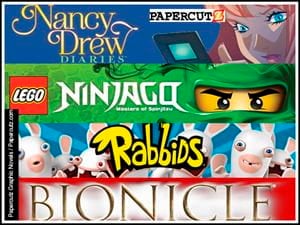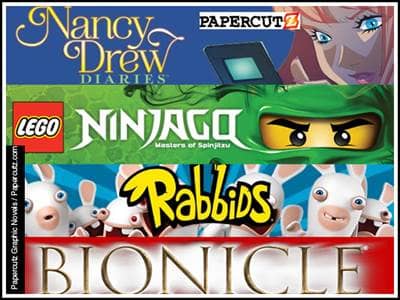
For two thousand years, this wisdom from the Apostle Paul (found in 1 Thessalonians 5:21, HCSB) has been a reliable guide for helping parents and kids navigate the moral currents of everyday life.
Still, Paul never dreamed of costumed superheroes and the rise of comic book culture. And he probably didn’t guess your kids would be obsessed with muscular men and buxom women wearing bright-colored tights. So what’s a modern American parent to do?
“Test all things. Hold on to what is good.”
Paul’s words are still true and still valuable today. In the 21st century, though, parents must sometimes dig a little deeper to discover “what is good” for our families to hold onto; to find out why kids love comics, and what parents should know about comic book culture.
Fortunately, Papercutz Graphic Novels creators Stefan Petrucha (writer) and Michael Petranek (editor) are willing to help. That’s why, at Denver Comic Con, FamilyFans met with these two veteran comics pros to get a little behind-the-scenes insight for modern moms and dads…
Stefan Petrucha and Mike Petranek. Wow, it’s an honor. Thanks for taking time with us. Help us get to know you a little bit to start: How did you discover comic books?
Stefan
It was how my grandfather taught me how to read! It was an issue of Superman’s Pal, Jimmy Olsen…It was Jimmy’s birthday and the League of Super Heroes gave him a ring and their costumes that gave him their powers temporarily. I didn’t know who any of these people were, but I was totally fascinated. Gripped. And it went on from there.
Michael
I was introduced to comics through the 1980s Justice League TV show, the cartoon. After that I was like, “OK, well, where’d this come from?” and I went to the comics. Then, through going to comic stores, I got into the X-Men and Spider-Man after that in the late 80s and early 90s. That cartoon show really got me into it, though.
Stefan, you’ve written very popular comics like Power Rangers, Rio, Nancy Drew, Mickey Mouse, and the X-Files. Michael, you’ve edited many of the same. What should parents know about the work you do, and the way you do that work?
Michael
I have to work well with others, let’s say that! Especially as an editor, I really have to work well with others. I started out making copies at Papercutz, and I’m an editor now. I would say that there’s a lot more that goes into it than it might seem. I went to school for theatre, as a director, and creating a comic can be a lot like that from my standpoint. Like putting together a whole production.
Stefan
The thing I would tell parents is that we’re conscious of our audience. Papercutz is for all ages, but it’s mainly for tweens and up, and we’re very careful with the licenses. Nancy Drew comics aren’t going to be written like Game of Thrones. But within that context we do exciting stories that teach valuable lessons, and at the same time present interesting characters in a fun way. So there’s that reassurance. And Michael seems to want to say something else...
Michael
I do, I do! I also want to say that we really respect the kid who reads our stories. We don’t want to talk down to the kid, but we want to make sure that almost anybody could pick up our graphic novels and be engaged.
Why do kids love comics?
Stefan
Because they’re very discerning! (Laughs)
People think you’re somehow not reading when you’re looking at a comic book, but you are. It’s a part of the brain that deals with visual and spatial information, and when you’re growing up, when you’re a kid, we pay attention to both of those things. So there’s an appeal and there’s a lot of power in the media that they, and a lot of adults now, tend to recognize.
Michael
It’s almost ironic because, really, reading a comic takes more parts of your brain. And kids are imaginative. I wish I was still as imaginative as I was when I was four years old. Kids are more open. I never get a question about—I think Grant Morrison said this—about ‘Who puts the air in the Batmobile tires?’ from a kid. The kid accepts it.
A Comic Con attracts all ages: parents, preschoolers, teens and preteens, even grandparents. What makes Comic book culture so appealing to people?
Michael
Here you can be whatever. Here is a very warm and welcoming atmosphere for the most part; not always, but mostly. I think walking into the halls of this exhibition center can be a lot less scary than walking in the halls of a high school.
Stefan
To get sociological for a second, when you become a teenager your identity changes. You’re finding your power in the world for the first time, which connects itself perfectly to the superhero myth. For the first time in your life, outside of your family, you’re becoming tribal. There’s a natural inclination to gather around your favorite band, your favorite this, your favorite that. But once again, the more discerning people are the ones who love comic books. (Laughter)
Why do YOU want kids to love comics?
Stefan
It’s a very special medium. It has an intimate affect that watching a movie or reading a book doesn’t. When you’re making the panels move, when you’re hearing your own voice as the characters’ voices, it creates a very unique, and in many ways personal, experience. I value that and try to reproduce it for readers.
Michael
And having had so many great experiences with comics myself, I want to pass it along. It’s one of those things. My passion for comics is something I don’t think I can keep if I don’t give it away.
Veteran comic book writer, Chuck Dixon, has suggested that comic book culture is influenced too much by political views; and many parents of faith are wary of that influence. What’s your take on that issue?
Michael
At Papercutz, we make a conscious decision that there should be nothing in our comics that would ever deter somebody from picking them up. I think having a political agenda falls under that. So I just don’t touch it.
All right, last question: What’s the most important thing in life, and how is that reflected in your work?
Stefan
Do unto others as you would have others do unto you.
Michael
I’d say, you are not your job. You are not how much money you make. You are not your physicality.
In my opinion—and this is so corny, and I hate to say it—but you are your spiritual and emotional condition. The way that’s reflected in my work is that I want to enable somebody to pick up a book and really enjoy it from a totally pure standpoint.
No other hidden agenda. Just enjoy a comic book for the experience it is.
Mike Nappa is an entertainment journalist at FamilyFans.com, a bestselling author, and a notorious Bible Study Nerd.




